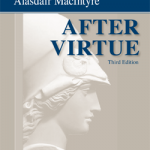
One of the reasons I attend Acton U is to improve my highly sketchy understanding of economics. I bear in mind that the folks at Acton don’t represent all economists by any means, but they claim that their positions are rooted in sound economics, and to understand (and either accept or refute them) these positions I need to understand the economic arguments. So while I enjoy sessions like “Maritain vs. MacIntyre” much more, I make sure to attend some economic sessions as well.
This year I attended a session on population economics, a session on the recent book _Capital_ by Thomas Piketty, and a session (or part of it) on crony capitalism and the reasons for the economic crash. I also attended a session by Alejandro Chafuen on the late Spanish scholastics and the roots of free-market thought, which fell more in my “intellectual history” comfort zone but obviously was also about economics.
My second time around, I’m finding that I already know a lot of what the speakers will say before they say it. I certainly learned quite a bit, but I experienced some frustration with the predictability of the rhetoric. That may be my problem, not theirs. They are saying this stuff because they think it’s true and well supported by the evidence. At this point, to figure out whether it’s true or not I need to do more reading and also talk to people of opposing views.
The lecture on population economics by Stephen Barrows, for instance, argued (as I expected) that a growing population is not fundamentally a problem and that alarmists from Malthus to Ehrlich lack confidence in human ingenuity. It didn’t answer what I’d consider some of the more fundamental questions, though. What about the environmental impact? What about the logical necessity that at _some_ point, even if it’s in hundreds of years, there really will be more people than the earth can support?
The lecture on Piketty, by Ross Emmett, was a helpful description of Piketty’s basic argument, and as far as I could tell (not having read the book) was basically fair. However, in the Q & A I thought Emmett was very quick to agree with quite dismissive responses to Piketty. Again, I need to read Piketty or discuss the matter with people who agree with him before forming an opinion. Piketty’s basic argument, apparently, is that income from capital is rising much more quickly than the GDP in general, creating a situation of increasing inequality between those who already have investments and those who don’t. Emmett predictably argued that inequality in itself is not necessarily bad. In the Q & A, I suggested that inequality did create troubling political dynamics, and he agreed but insisted that the first priority was to eliminate extreme poverty, which was happening through free-market capitalism. The implication, as usual at Acton, is that government interventions of the kind Piketty was calling for would get in the way of that goal. And yet, in spite of all the corruption described in “Poverty Inc.,” and in spite of all the bad policies that Acton folks rail against, poverty is apparently in the course of vanishing (according to Emmett and other Acton speakers). Perhaps the free market is more resilient even than its defenders suppose?
The talk on “crony capitalism,” the last (other than Sirico’s final plenary address) that I attended this year, was crowded and I was among those standing outside and unable to hear well. Also, I was very tired by that point. Hence, I left when the Q & A started and probably didn’t learn as much as I might have. The speaker, Jay Richards (with the predictable Twitter handle “FreemarketJay”), explained this common Acton bogeyman in terms of the financial crisis of 2008. Defenders of the free market, particularly libertarians, often describe what we have in the U.S. today as “crony capitalism” rather than real capitalism. I find this move to be suspiciously similar to the way Marxists will say that any actual Communist society wasn’t really implementing Marx’s ideas. At some point one has to ask: “where is non-crony capitalism actually being practiced?” In any society that has a government at all, aren’t the rich going to get the government to do special deals for them? Is perhaps our “special interest” politics an imperfect but reasonable way of trying to limit the power of the wealthy over government?
Richards didn’t address these questions, and it was unreasonable of me to expect it, since the talk was specifically about the financial crisis. But he did surprise me (though I shouldn’t have been surprised, given that I was at Acton) by arguing that “crony capitalism” really is more often about the government blackmailing businesses into doing what the government wants than about businesses actively seeking out government patronage. He used the financial crisis to illustrate this, detailing the ways in which government policy had increasingly forced banks to give subprime loans to people who would not traditionally be eligible. I found his discussion helpful as a way of understanding the financial crisis (which affected both my employment and my housing situation in some pretty serious ways). I think he made an important point that “crony capitalism” may often involve government initiative to set up situations in which private enterprises have to behave in certain ways in order to succeed, and that these are often destructive. However, he seemed to be implying that (as usual at Acton) government is always the bad guy. I would love to hear a discussion of, say, eminent domain and controversies over natural gas pipelines (one such controversy is brewing in Kentucky, where I now live). But that wasn’t the talk he signed up to give. If I go next year, I will try to find such a talk. But it’s possible that my further education in these matters needs to take place elsewhere.










